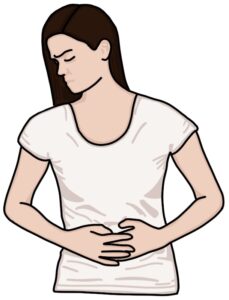Irritable bowel syndrome (IBS) is caused by a disturbance of the gut-brain interaction, resulting in troublesome abdominal and intestinal symptoms. Symptoms can significantly impact the patient’s life.
Irritable bowel syndrome is a functional disorder. This means there is no identifiable bowel disease underlying the symptoms, and the symptoms result from the abnormal functioning of an otherwise normal bowel.
It occurs in up to 20% of the population. It affects women more than men and is more common in younger adults.

Symptoms
The three key features can be remembered with the IBS mnemonic:
- I – Intestinal discomfort (abdominal pain relating to the bowels)
- B – Bowel habit abnormalities
- S – Stool abnormalities (watery, loose, hard or associated with mucus)
The specific symptoms vary with individuals. Common symptoms include:
- Abdominal pain
- Diarrhoea
- Constipation
- Fluctuating bowel habit
- Bloating
- Worse after eating
- Improved by opening bowels
- Passing mucus
Symptoms can be triggered or worsened by:
- Anxiety
- Depression
- Stress
- Sleep disturbance
- Illness
- Medications
- Certain foods
- Caffeine
- Alcohol
Differential Diagnosis
It is important to exclude serious underlying pathology. The top differentials to keep in mind are:
- Bowel cancer
- Inflammatory bowel disease
- Coeliac disease
- Ovarian cancer (often presents with vague symptoms, particularly bloating in women over 50 years)
- Pancreatic cancer
Diagnosis
A thorough history and examination are required to identify the typical features of IBS and exclude red flags for other underlying pathology.
Investigations can be used to assess for underlying differentials (normal in IBS):
- Full blood count for anaemia
- Inflammatory markers (e.g., ESR and CRP)
- Coeliac serology (e.g., anti-TTG antibodies)
- Faecal calprotectin for inflammatory bowel disease
- CA125 for ovarian cancer
The NICE clinical knowledge summaries (updated 2022) suggest before a diagnosis, differentials need to be excluded, and the patient should have at least 6 months of abdominal pain or discomfort with at least one of:
- Pain or discomfort relieved by opening the bowels
- Bowel habit abnormalities (more or less frequent)
- Stool abnormalities (e.g., watery, loose or hard)
For a diagnosis, patients also require at least two of:
- Straining, an urgent need to open bowels or incomplete emptying
- Bloating
- Worse after eating
- Passing mucus
Management
The first step is making a positive diagnosis, explaining the condition and reassuring the patient that evidence of other pathology has been excluded.
Lifestyle advice includes:
- Drinking enough fluids
- Regular small meals
- Adjusting fibre intake according to symptoms (more fibre if predominantly constipated, less with diarrhoea/bloating)
- Limit caffeine, alcohol and fatty foods
- Low FODMAP diet, guided by a dietician
- Probiotic supplements may be considered over-the-counter (discontinuing after 12 weeks if there is no benefit)
- Reduce stress where possible
- Regular exercise
First-line medications depend on the symptoms:
- Loperamide for diarrhoea
- Bulk-forming laxatives (e.g., ispaghula husk) for constipation (lactulose can cause bloating and is avoided)
- Antispasmodics for cramps (e.g., mebeverine, alverine, hyoscine butylbromide or peppermint oil)
There is only weak evidence for the benefit of using antispasmodic medications, and they may cause side effects.
Linaclotide is a specialist secretory drug for constipation in IBS when first-line laxatives are inadequate.
Other options include where symptoms remain uncontrolled:
- Low-dose tricyclic antidepressants (e.g., amitriptyline)
- SSRI antidepressants
- Cognitive behavioural therapy (CBT)
- Specialist referral for further management
Last updated May 2023
Now, head over to members.zerotofinals.com and test your knowledge of this content. Testing yourself helps identify what you missed and strengthens your understanding and retention.

